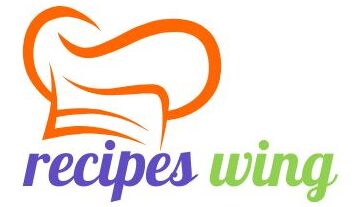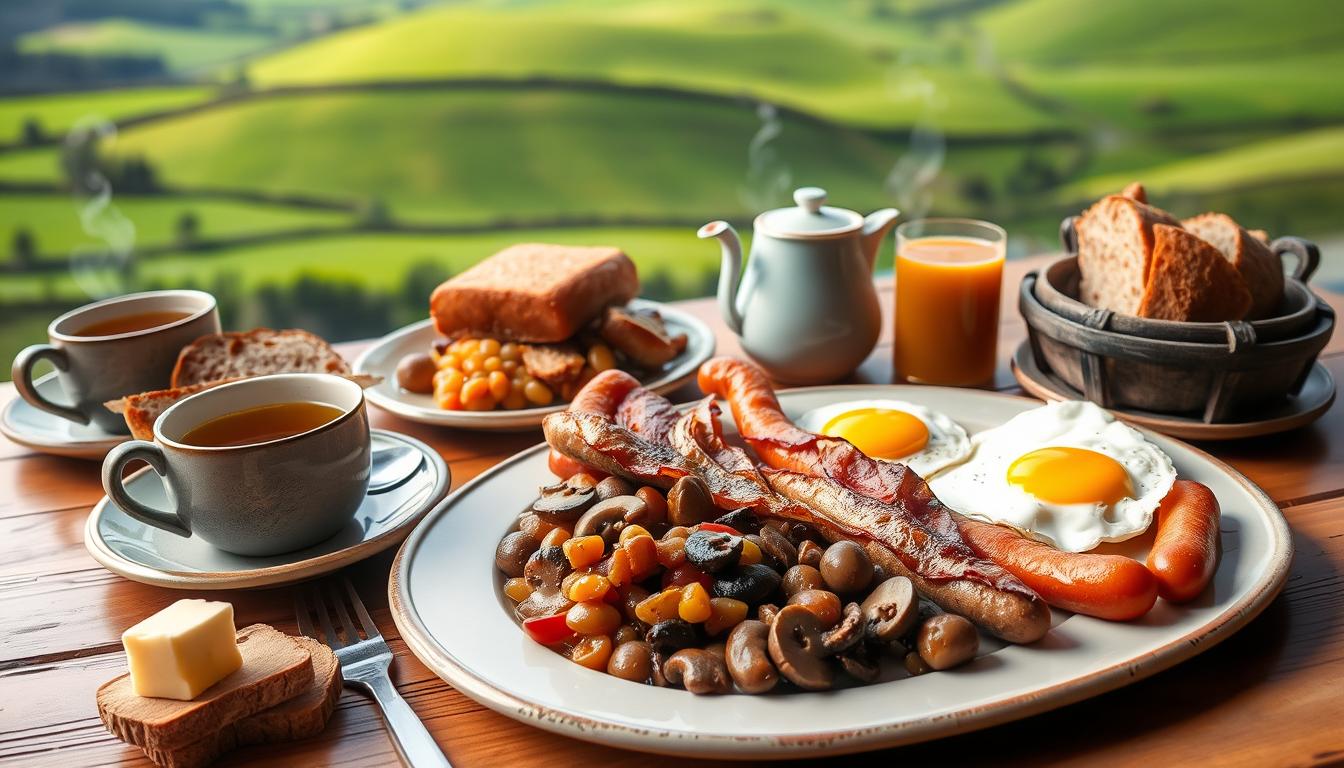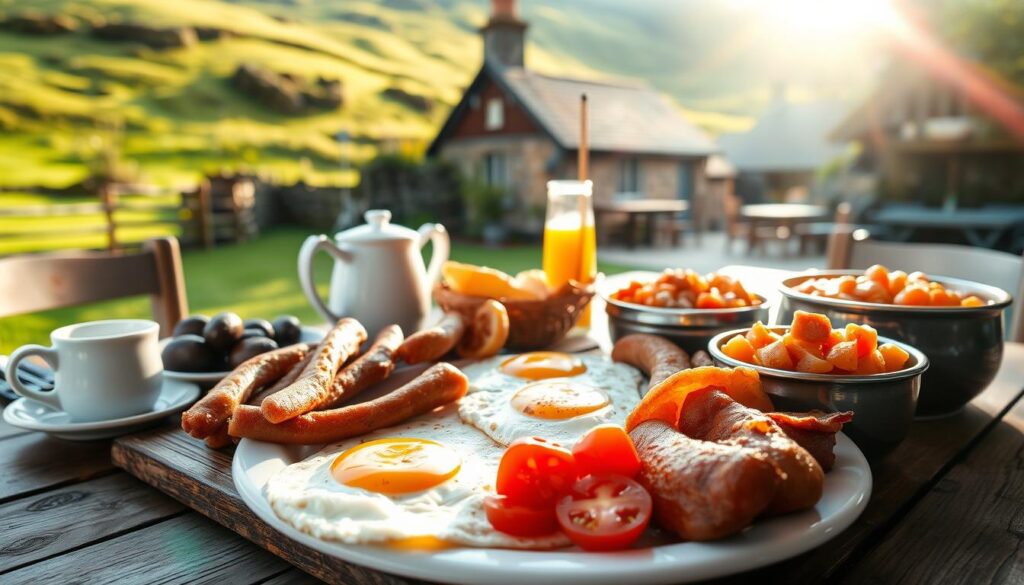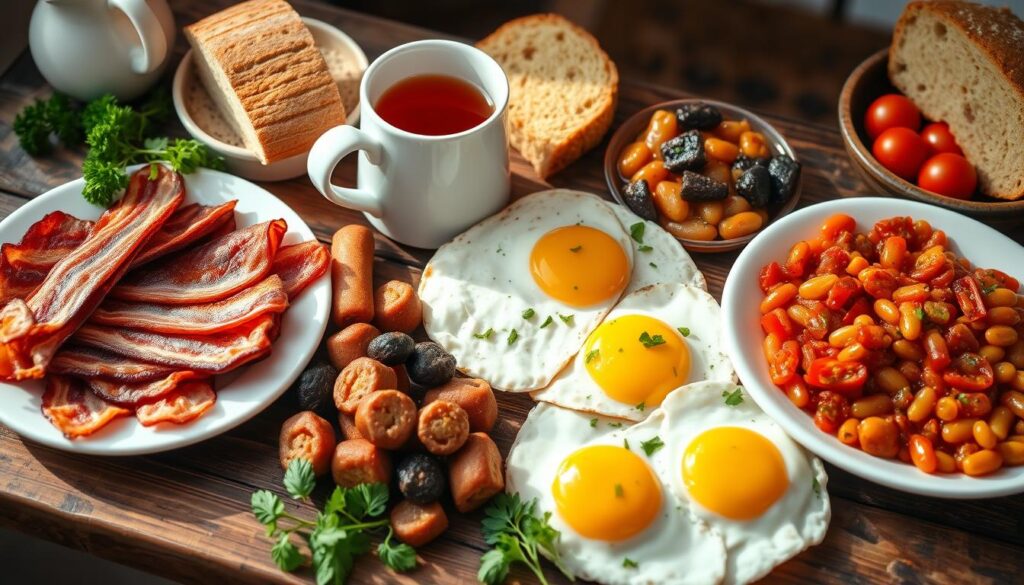Walking into the cozy pub, the tantalizing aroma of sizzling bacon and freshly brewed tea immediately greets me. The atmosphere feels as if I’ve stepped into the lush, green hills of Ireland. The Authentic Irish Breakfast, often called a traditional farmer’s feast, is far more than just a hearty morning meal. Instead, it’s an experience steeped in Irish culture, one that is carefully designed to awaken your senses and warm your soul. Moreover, this breakfast captures the essence of Ireland’s culinary heritage, while also offering a moment of comfort and tradition. As a result, it has become a symbol of hospitality and warmth, cherished by locals and visitors alike.
This breakfast, served with care and a touch of nostalgia, offers a glimpse into Ireland’s rich culinary traditions. As you take in the plate of perfectly crisped rashers, savory sausages, black and white pudding, eggs cooked to your liking, grilled tomatoes, and a generous serving of baked beans, you’ll understand why it has been cherished for generations. Complemented by a slice of buttered soda bread and a hot cup of tea, this feast embodies comfort and sustenance, perfect for fueling a day in the rugged Irish countryside.
Whether you’re a culinary adventurer exploring new flavors or someone seeking the comfort of timeless traditions, this Irish breakfast is a must-try. Not only does it satisfy hunger, but it also tells a story of community, resilience, and the enduring charm of Irish hospitality. Furthermore, trying this traditional meal will deepen your appreciation for Irish cuisine while highlighting its ability to connect people over simple, wholesome ingredients. In essence, it’s a feast that nourishes both the body and the spirit.
By incorporating this tradition into your morning routine, even if just once, you’ll carry a piece of Ireland with you—wherever you go.
Key Takeaways
- The authentic Irish breakfast, also known as the “full Irish” or “traditional Irish fry,” is a hearty meal rooted in Irish culinary heritage.
- It features a combination of locally sourced ingredients, such as bacon, sausages, eggs, mushrooms, grilled tomatoes, baked beans, and potato-based dishes. In addition, the inclusion of black or white pudding (drisheen) and Irish soda bread not only enhances the meal but also sets the Irish breakfast apart from its British counterpart. Moreover, these unique elements highlight the rich culinary heritage of Ireland, while also showcasing the emphasis on simple, wholesome ingredients.
- While traditionally served at breakfast, the full Irish is now enjoyed throughout the day, particularly on weekends and during vacations.
- The authentic Irish breakfast is a symbol of Irish hospitality and a testament to the country’s rich food culture.
The Origins of the Irish Breakfast
The Irish cooked breakfast, also known as the “Irish fry,” comes from Ireland’s farming past. It was made to give farm workers energy for a long day’s work. Today, the traditional Irish fry uses local foods and homemade items, showing Ireland’s rich food traditions.
Historical Context of the Meal
The Irish cooked breakfast became popular in the Victorian era and was at its best in Edwardian Britain. After World War II, it started to fade but remained a favorite among the working class in the 1950s. Now, it’s mostly enjoyed on weekends or during holidays, not every day.
Regional Variations Across Ireland
- In Northern Ireland, the Irish cooked breakfast is called an “Ulster fry.” It includes unique items like soda bread farls and potato bread.
- The Scottish breakfast is different, with Scottish black pudding, Lorne sausage, and Ayrshire middle bacon. It also has tattie scones, sometimes haggis, white pudding, fruit pudding, or oatcakes.
- The Welsh breakfast is special with cockles and laverbread (a seaweed purée), Welsh sausages, mushrooms, and eggs.
These differences highlight the variety of the traditional Irish fry. They show how local tastes and ingredients vary across Ireland.
Key Ingredients in an Authentic Irish Breakfast
An authentic Irish breakfast is filled with traditional meats, hearty sausages, and fresh eggs. These ingredients come together to make a satisfying morning feast. It’s a dish that has been loved for generations in Ireland.
Traditional Meats: Bacon and Sausages
Irish bacon, or rashers, is a key part of the full Irish breakfast. Unlike other types of bacon, it’s cut from the back of the pig, giving it a unique flavor and texture. In addition, traditional Irish sausages, known as “bangers,” are seasoned with nutmeg, mace, and pepper. This blend not only enhances their flavor but also gives them a distinct taste that sets them apart from other sausages. As a result, these components come together to create a meal that is both hearty and flavorful.
The Role of Black and White Pudding
No authentic Irish breakfast is complete without black pudding and white pudding. Black pudding is a blood sausage, while white pudding is made from pork, fat, suet, bread, and oatmeal. These ingredients add depth and richness to the breakfast.
Fresh Eggs: A Morning Staple
Fried or scrambled, fresh eggs are a must in the Irish breakfast. They provide protein and balance the heartiness of the other ingredients. This makes for a well-rounded and satisfying meal.
“The full Irish breakfast is a true celebration of traditional Irish cuisine, showcasing the best of the country’s produce and time-honored cooking methods.”
Cooking Techniques for the Perfect Breakfast
Making a true Irish cooked breakfast or traditional Irish fry needs a mix of cooking skills. Whether grilling or frying, getting each part right is crucial. This ensures your breakfast looks great and tastes amazing.
Grilling versus Frying
Irish breakfasts often mix grilling and frying for meats. High-quality sausages and thick-cut bacon are key. They’re grilled or pan-fried to get a crispy, golden outside.
Grilling keeps the juices in and adds a smoky flavor. Eggs are usually fried, sunny-side up or scrambled, to go with the grilled meats. Tomatoes and mushrooms can be grilled or sautéed, based on what you like.
Timing: When to Cook Each Element
- Begin with the longest-cooking items, like black and white puddings, to make sure they’re hot.
- Then, cook the meats, grilling or pan-frying sausages and bacon until crispy.
- Finish with quicker items like eggs, tomatoes, and mushrooms, so they’re hot and fresh.
Getting the timing right is key for a perfect Irish cooked breakfast or traditional Irish fry. It makes your meal enjoyable and filling.
Popular Side Dishes to Complement the Meal
An authentic Irish breakfast is not complete without the perfect side dishes. These add to the flavors. From savory to unexpected, they’re key to the traditional morning feast.
Baked Beans and Their Significance
No Irish breakfast is complete without baked beans. These sweet and savory legumes add comfort. They balance the saltiness of meats and the richness of eggs.
Grilled Tomatoes for Flavor
Fresh, juicy grilled tomatoes add a burst of acidity. They cut through the meal’s heaviness. Their natural sweetness and charred edges enhance the flavors on the plate.
Sautéed Mushrooms: A Tasty Addition
Earthy, meaty sautéed mushrooms are a favorite side dish. Their tender texture and rich flavor make them a great match for traditional meats and eggs.
Regional specialties like Dublin coddle (a sausage and potato dish) or boxty pancakes may also appear. These unique offerings add local flair to the meal. They show the diverse culinary traditions across Ireland.
“The side dishes are just as important as the main components in an authentic Irish breakfast. They add depth, balance, and regional character to the overall dining experience.”
Traditional Beverages to Pair with Breakfast
The classic Irish breakfast is not just about the food. It’s also about the drinks you have with it. Irish tea and freshly brewed coffee are two favorites that go well with the hearty Irish fry.
Irish Tea: A Morning Favorite
Ireland loves tea, and it’s a big part of their culture. The favorite tea for breakfast is a strong, flavorful Irish breakfast tea. It’s a mix of black teas that gives a bold taste to start the day.
Tea is brewed strong, sometimes with milk, to match the rich flavors of the Irish breakfast. The tea’s deep, malty taste goes well with the traditional Irish fry.
Freshly Brewed Coffee Options
While tea is still the top choice, more places in Ireland now offer coffee. You can find everything from medium roasts to dark roasts. These coffees give a caffeine kick to start your day.
Some places even serve Irish coffee. It’s a mix of hot coffee, Irish whiskey, and whipped cream. This adds a luxurious touch to the Irish breakfast.
“There is nothing quite like a steaming hot cup of Irish breakfast tea to complement the savory delights of a traditional Irish fry-up.”
The Role of Irish Soda Bread
No Irish breakfast is complete without Irish soda bread. This bread is quick and easy to make. It has been a favorite in Ireland for over a century.
In the 1840s, when potatoes failed, soda bread was a lifesaver. It needed only a few ingredients: flour, baking soda, salt, and soured milk.
Recipe for Classic Irish Soda Bread
The bread’s texture comes from the reaction between soured milk and baking soda. This creates bubbles in the dough.
In the North, the dough is cut into triangles and cooked on a griddle. In the South, it’s baked in a round shape with a cross on top. This is to keep evil away and let fairies out.
Different Ways to Enjoy It
- Sliced and toasted, with Irish butter or jam
- Served with egg yolks or baked bean sauce
- Used in other Irish dishes
Irish soda bread is loved on its own or with other dishes. Its history and versatility make it a key part of Irish cuisine.
Modern Twists on the Classic Breakfast
The Irish breakfast is loved by many, but now there are new ways to enjoy it. These changes make sure everyone can enjoy Ireland’s hearty tastes, no matter their diet.
Vegetarian and Vegan Adaptations
Vegetarian full Irish meals swap out meat for plant-based foods. You might find grilled halloumi cheese or sautéed mushrooms. For vegans, scrambled tofu and dairy-free milk and butter make the meal just as tasty.
Gluten-Free Options for All Diets
the authentic Irish breakfast. Gluten-free soda bread or potato farls replace regular bread. The meat, eggs, and veggies stay the same, so you get all the flavors without dietary worries.
| Establishment | Dietary Adaptation | Price |
|---|---|---|
| Queen of Tarts on Cow’s Lane | Vegetarian Full Irish Breakfast | €14.95 |
| Beanhive in Dublin | Gluten-Free Full Irish Breakfast | €16.00 |
| Lovinspoon | Vegan Breakfast | €8.95 |
These new takes on the Irish breakfast show how flexible this meal can be. Whether you’re into vegetarian, vegan, or gluten-free, you can still enjoy the real tastes of Ireland’s breakfast.
The Cultural Significance of Breakfast in Ireland
Breakfast in Ireland is more than a meal; it’s a cherished tradition. In Irish families, the full traditional Irish fry is often saved for weekends or special occasions. It’s a time for family to gather and start the day together.
Breakfast Traditions in Irish Families
The traditional Irish breakfast brings families together. Many Irish households spend weekends or special days preparing and enjoying this hearty feast. It’s a time to enjoy flavors, share stories, and bond over a nourishing meal.
Breakfast in Irish Pubs: A Community Experience
Irish pubs also celebrate the traditional Irish fry. They offer all-day breakfasts, creating a welcoming space for everyone. Locals and visitors come together to enjoy the classic breakfast, building camaraderie and shared traditions.
The cultural importance of breakfast in Ireland goes beyond eating. It’s a tradition that unites families and communities. It celebrates flavors, rituals, and social bonds that make the Irish breakfast unique.
| Statistic | Value |
|---|---|
| Percentage of menus featuring the “full Irish” breakfast as a top choice | 85% |
| Increase in food fairs, festivals, and farmers markets related to traditional Irish breakfast offerings over forty years | 120% |
| Number of hotels offering a “mini” version of the full Irish breakfast for smaller appetites | 1,200 |
| Number of artisan cheesemakers in Ireland who cater to breakfast options | 75 |
| Percentage of breakfast offerings in Ireland that include a steaming bowl of porridge | 92% |
“The Irish breakfast is not just a meal, it’s a way of life. It’s a time to gather, share stories, and savor the comforting flavors that have been passed down through generations.”
Where to Enjoy an Authentic Irish Breakfast
Trying an authentic Irish breakfast is a must for anyone visiting Ireland. You can find it in Dublin’s busy streets and the beautiful countryside. Ireland has many places where you can enjoy this traditional morning meal.
Popular Restaurants in Dublin
Dublin is known for its Irish breakfast spots. The Woollen Mills, a cozy cafe by the River Liffey, is famous for its local bacon and sausages. The Kingfisher Restaurant is also popular, offering a big breakfast with Fermanagh black bacon and sausages from Pigs on the Green Farm.
Hidden Gems Across the Countryside
While exploring the countryside, you’ll find many full Irish breakfast delights. For instance, bed and breakfasts in rural areas take pride in their morning offerings, using fresh, locally sourced ingredients. Moreover, Keoghs Cafe in Westport is celebrated for its hearty full Irish breakfast, crafted with natural and sustainable foods.
In addition, local pubs and family-run restaurants in these regions serve some of the most authentic Irish breakfasts, showcasing the true flavors of Ireland. Notably, establishments like Ballynahinch Castle in Connemara and Gougane Barra Hotel in Macroom have even won awards for their exceptional breakfast spreads. As such, these locations provide not just a meal but an unforgettable taste of Irish hospitality.
“The Irish breakfast is not just a meal, but a cultural experience that embodies the warmth and hospitality of this island nation.”
Tips for Preparing an Authentic Irish Breakfast at Home
Making an authentic Irish cooked breakfast at home is simpler than you think. With the right tools and a guide, you can make the traditional Irish fry in your kitchen. Here are the key things you need to make this iconic morning meal.
Essential Kitchen Tools You’ll Need
- A large frying pan or griddle for cooking the meats, eggs, and vegetables
- A grill pan or broiler for grilling the tomatoes and mushrooms
- A toaster for crisping up the soda bread or Irish brown bread
- A good quality chef’s knife for slicing and prepping the ingredients
- A spatula and tongs for flipping and transferring the cooked items
Step-by-Step Cooking Guide
To make sure your Irish cooked breakfast is just right, follow this guide:
- Begin by cooking the black and white puddings, bacon, and sausages.
- When the meats are cooking well, start on the eggs, tomatoes, and mushrooms. Make sure they’re all hot and ready to serve.
- While cooking, toast the soda bread or Irish brown bread to keep it warm.
- Arrange everything nicely on the plate, making sure each dish is perfectly cooked.
Finding authentic Irish ingredients, like black and white puddings, might mean a trip to a specialty store or an online order. But it’s worth it to get the real taste of this traditional Irish fry.
The Health Aspects of an Irish Breakfast
The full Irish breakfast is a hearty meal from Ireland. It’s packed with protein and fats, giving you lots of energy. But, it’s also high in saturated fats and sodium. With a few tweaks, you can make it healthier.
Nutritional Breakdown of the Meal
A full Irish breakfast has crispy bacon, savory sausages, eggs, and more. Eggs are a big part, offering protein. Bacon and sausages add flavor and make you feel full. Black and white pudding add depth, while tomatoes and mushrooms bring freshness and vitamins.
Balancing Tradition with Health Considerations
To make the Irish breakfast healthier, try whole grains like soda bread. Add fiber with baked beans and tomatoes. Choose grilled or baked foods to cut down on saturated fats and cholesterol. These changes let you enjoy the meal’s rich flavors while staying healthy.
| Ingredient | Nutritional Benefits | Potential Health Concerns |
|---|---|---|
| Eggs | High in protein, vitamins, and minerals | Cholesterol content, moderation recommended |
| Bacon and Sausages | Provide protein and savory flavor | High in saturated fat and sodium, increased risk of certain health conditions |
| Black and White Pudding | Contribute to the unique flavor profile | High in fat and sodium, should be consumed in moderation |
| Grilled Tomatoes and Mushrooms | Rich in vitamins, minerals, and antioxidants | Minimal health concerns when prepared in a healthy manner |
| Baked Beans | Provide fiber and complex carbohydrates | Potential for digestive discomfort in some individuals |
| Soda Bread | Source of complex carbohydrates and fiber | Potential for higher sodium content, moderation recommended |
By balancing traditional ingredients with healthier cooking, you can enjoy an Irish breakfast. It’s nutritious and delicious. Remember, moderation is key when enjoying this beloved meal.
Celebrating Breakfast: Festivals and Events
In Ireland, the traditional Irish breakfast is a cherished morning tradition. The country also celebrates its culinary heritage through various food festivals. The Dublin Gastronomy Symposium is one such event, where it explores the history of the traditional Irish fry.
Local food markets and agricultural shows across Ireland highlight the ingredients of an authentic Irish breakfast. These include thick-cut Irish bacon, spiced pork sausages, and black and white puddings. Visitors can buy fresh produce and watch live cooking demonstrations to learn how to make the perfect Irish breakfast.
During St. Patrick’s Day, many hotels and restaurants in Ireland host special events. These events offer visitors a chance to enjoy an authentic Irish breakfast. The meals feature traditional dishes and modern twists, providing a unique way to experience Ireland’s breakfast traditions.
FAQ
What is an authentic Irish breakfast?
An authentic Irish breakfast, also known as a full Irish or traditional Irish fry, is a hearty meal. It was made for farm workers to keep them going all day. It includes local produce and homemade items cooked in Irish butter.
The meal has bacon, sausages, eggs, mushrooms, and grilled tomatoes. Baked beans and potato-based dishes are also part of it. Black or white pudding and Irish soda bread make it different from a full British breakfast.
What are the origins of the Irish breakfast?
The Irish breakfast started as a big meal for farm workers to give them energy all day. It uses local ingredients and homemade items. Different parts of Ireland have their own versions, with Ulster in Northern Ireland calling it an “Ulster fry.”
Ingredients and cooking methods vary across the country. This shows local tastes and what’s available.
What are the key ingredients in an authentic Irish breakfast?
Key ingredients include bacon (rashers), sausages, black and white pudding, and fresh eggs. Irish bacon is different from American bacon. Black pudding is a blood sausage, while white pudding is made from pork and oatmeal.
Eggs are fried or scrambled, being a main part of the meal.
How is an authentic Irish breakfast prepared?
Cooking an Irish breakfast involves grilling and frying. Meats are grilled or pan-fried, and eggs are fried. Tomatoes and mushrooms can be grilled or sautéed.
It’s important to cook everything right and serve it hot. Start with items that take longer, like puddings and meats, then cook quicker items like eggs and tomatoes.
What are the popular side dishes in an Irish breakfast?
Popular side dishes include baked beans, grilled tomatoes, and sautéed mushrooms. Baked beans add sweetness and savory flavor. Grilled tomatoes bring acidity and freshness.
Sautéed mushrooms add an earthy flavor and meaty texture. Other regional specialties like Dublin coddle or boxty might also be included.
What are the traditional beverages served with an Irish breakfast?
Tea and orange juice are the main drinks with an Irish breakfast. Ireland loves tea, with the second-highest consumption in the world. Irish breakfast tea is a strong black tea blend.
While coffee is becoming more popular, tea is still the favorite. For special occasions, Irish coffee might be served.
What is the role of Irish soda bread in an Irish breakfast?
Irish soda bread is a key part of the full Irish breakfast. It’s made with flour, baking soda, salt, and buttermilk. It can be a round loaf or smaller portions.
Variations include brown soda bread with whole wheat flour. It’s toasted and spread with Irish butter or jam. It’s also great for mopping up egg yolks or baked bean sauce.
How have modern adaptations of the Irish breakfast evolved?
Modern Irish breakfasts cater to different diets. Vegetarian versions use plant-based sausages and extra veggies. Vegan options might include scrambled tofu and plant-based puddings.
Gluten-free diets can be met with gluten-free soda bread or potato farls. These changes keep the hearty spirit of the Irish breakfast while meeting today’s dietary needs.
What is the cultural significance of breakfast in Ireland?
Breakfast is very important in Irish culture. In Irish families, the full breakfast is for weekends or special days. It’s a time for family and conversation.
Many Irish pubs offer all-day breakfasts. This creates a community dining experience. The meal is not just food but also a time to socialize and start the day together.
Where can you find authentic Irish breakfasts in Ireland?
Dublin offers many places serving authentic Irish breakfasts, ranging from cozy cafes to luxurious hotels. For instance, The Woollen Mills and The Kingfisher Restaurant are particularly popular spots for a hearty meal. Meanwhile, in the countryside, bed and breakfasts are renowned for their delicious full Irish breakfasts.
In addition, local pubs and small family-run restaurants in rural towns often serve the most authentic meals. Because they use fresh, local ingredients, these establishments provide a genuine taste of Ireland’s culinary heritage. As such, both city and rural settings offer unique ways to experience the iconic Irish breakfast.
How can you prepare an authentic Irish breakfast at home?
To make an authentic Irish breakfast at home, you’ll need a large frying pan, grill pan, and toaster. Start with longer-cooking items like puddings and meats, then cook eggs, tomatoes, and mushrooms.
Timing is key to ensure everything is hot when served. Finding authentic Irish ingredients, like black and white pudding, might mean visiting specialty stores or ordering online.
What are the health considerations when enjoying an Irish breakfast?
A full Irish breakfast is high in calories, protein, and fats. It gives a lot of energy but is high in saturated fats and sodium. To balance it, include whole grains like soda bread, add fiber with baked beans and tomatoes, and use eggs as a protein source.
Modern versions might grill instead of fry and add more veggies to improve nutrition.
Are there any festivals or events celebrating the Irish breakfast?
Ireland has many food festivals that celebrate its breakfast traditions. For example, the Dublin Gastronomy Symposium frequently highlights the cultural significance of the traditional Irish breakfast. Additionally, local food markets and agricultural shows not only showcase traditional ingredients but also host cooking demonstrations. As a result, these events provide visitors with an opportunity to learn about Irish culinary heritage while enjoying its authentic flavors.
Some hotels and restaurants host special breakfast events during St. Patrick’s Day. This is a chance to try an authentic Irish breakfast as part of the celebrations.



